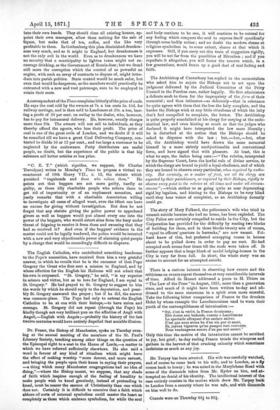The Archbishop of Canterbury has replied to the memorialists who
asked him to enjoin the Bishops not to act upon the judgment delivered by the Judicial Committee of the Privy Council in the Purchas case, rather happily. He first administers a delicate snub to them for the impropriety of the form of their memorial ; and then intimates—as delicately—that in substance he quite agrees with them that the less the laity complain, and the harder the Bishops wink at any little ritualisms of which the laity don't feel compelled to complain, the better. The Archbishop is quite properly scandalized at his clergy for carping at the eccle- siastical law, and even hinting so much as that the judges who declared it might have interpreted the law more liberally ; he is disturbed at the notion that the Bishops should be asked to dispense with the law ; but, —but, --but, after all, the Archbishop would have drawn the same memorial himself in a more strictly unobjectionable and conventional form, and have signed that with pleasure. At least, this is what he says, the italics being ours :—" The rubrics, interpreted by the Supreme Court, form the lawful rule of divine service, to which the clergy are bound to yield a loyal obedience, and of which they are, bound to observe every particular, when required by autho- rity. But certainly, as a matter of fact, not all the clergy are expected by their parishioners, or required by their Bishops, rigidly to observe every point in the rubrics at all times and under all circum- stances"; —which strikes us as going quite as near deprecating rigid lay legalism, and hinting to the Bishops to be very blind until they hear voices of complaint, as an Archbishop decently could go.


































 Previous page
Previous page